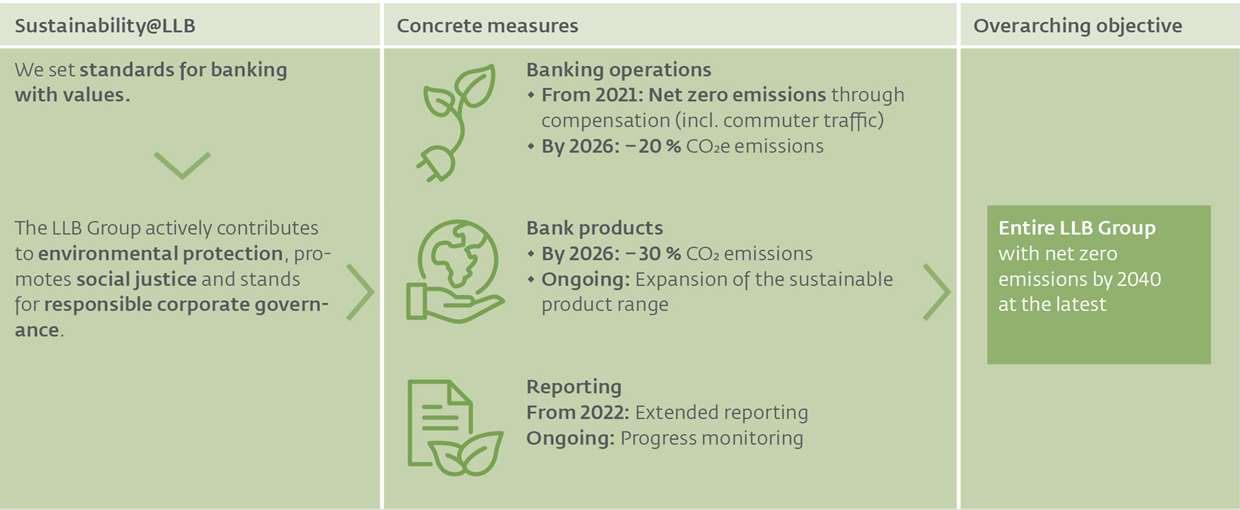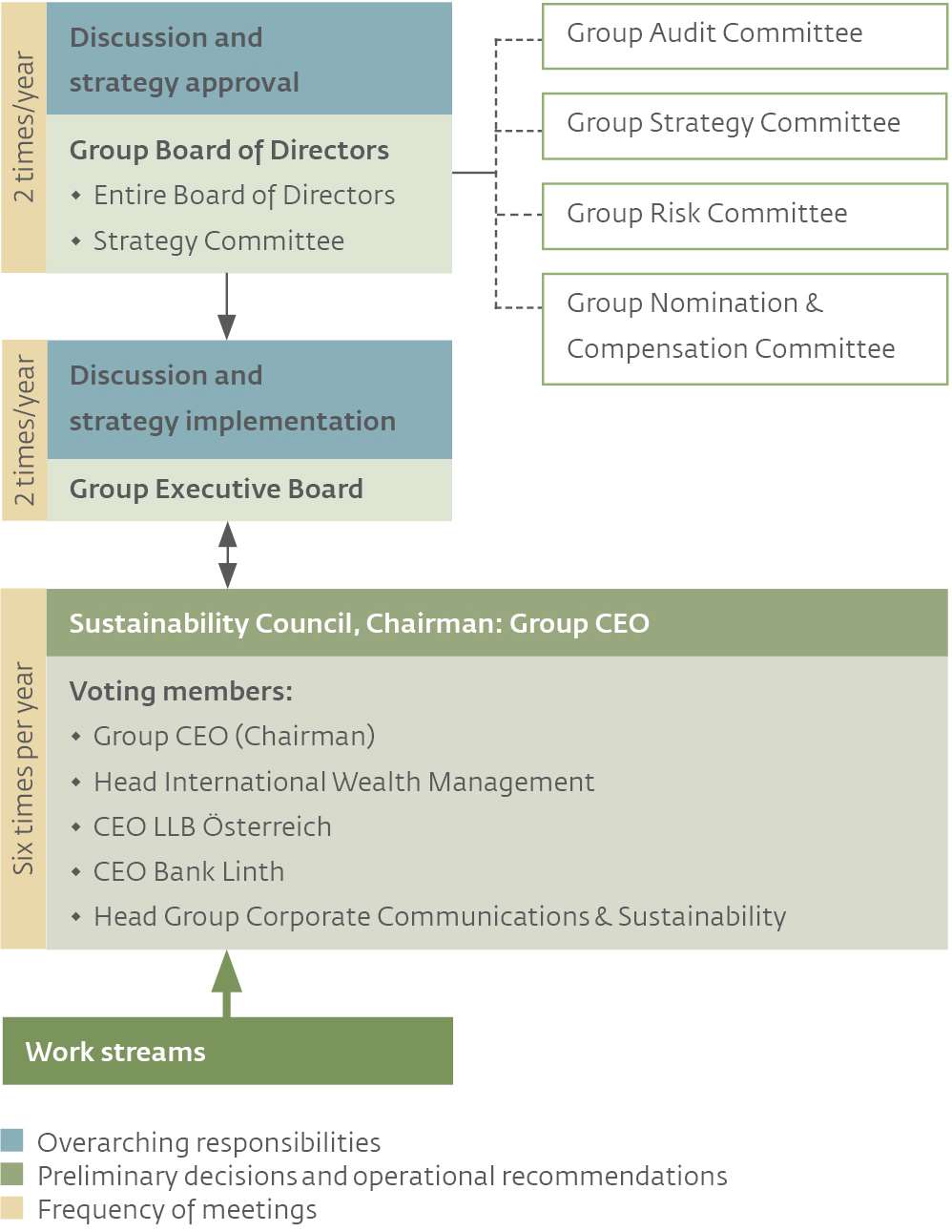Responsibilities for the economy, society and environment
Information checkedInformation unaudited Information geprüft Information ungeprüft Responsibilities for the economy, society and environment
As a financial institution with a long-term orientation, the LLB Group is committed to leaving an environment that is as intact as possible and stable social conditions for the coming generations. With our new corporate strategy and even more ambitious goals, we are proceeding resolutely down this path.
Performance mandate and sustainability
As the oldest bank in Liechtenstein and steeped in tradition, LLB understands the special responsibility it has for taking a long-term approach. Sustainable business management is part of its performance mandate and its corporate identity. We have a legal obligation to our majority shareholder, the Principality of Liechtenstein, to promote Liechtenstein’s economic development while at the same time taking ethical and environmental factors into account. We fulfil this special obligation by offering a diverse portfolio of products and services, applying sustainable standards to our offerings, our infrastructure and procurement, and engaging broadly in society.
Sustainability as a strategic goal
Sustainability is an integral part of our DNA. With our ACT-26 corporate strategy, we are going a step further: the LLB Group wants to play a pioneering role in the future. Sustainability is one of our three strategic core elements (see chapter “Strategy and organisation”).
Our aim with ACT-26 is to be perceived as a bank that is stable, sustainable and innovative. We also want to differentiate ourselves from our competitors through it.
Overview of the sustainability strategy

Goals of the sustainability strategy
We have set ourselves the goal of reducing the net CO2 emissions of the LLB Group to zero by 2040 – in line with the UN’s ambitious target to limit global warming to 1.5°C. Our Board of Directors has adopted a sustainability strategy. Its implementation happens at the Group Executive Board level in close co-operation with our Sustainability Council (see section “Sustainability governance of the LLB Group”).
Banking operations
As a first partial step in this direction, the LLB Group became climate neutral in the 2021 business year by fully offsetting its CO2 emissions. In co-operation with the Swiss climate foundation “myclimate”, we support various CO2-reducing projects in the region and around the world. Among these is a reforestation initiative in western Uganda and a project for fertile soil as a CO2 sink in the Lake Constance region.
At the same time, we have initiated measures (see chapter “Corporate environmental and climate protection”) to ensure that emissions in our banking operations are net zero by 2040.
Bank products
In addition to adapting its day-to-day operations, the LLB Group also wants to support its clients on the way to climate neutrality: with expert advisory services and differentiated, sustainable products. Specifically, the Group has set itself here, too, the goal of reducing the CO2 emissions of all bank products to net zero by 2040. This would mean the LLB Group becoming completely climate neutral across its banking operations and its products ten years earlier than defined in the Paris climate agreement.
Adapting our offerings is a key factor in achieving the targets that we have set for ourselves. Consequently, the LLB Group has greatly expanded its range of sustainable investment products. In addition to its well-established asset management and advisory services, it also offers a comprehensive selection of sustainable funds. Launched by LLB in 2022, the two dark green LLB Impact Climate funds, which have a discernible, positive impact on the environment and nature, have an investment volume already in excess of CHF 700 million.
The LLB Group is convinced that sustainability is not only indispensable for preserving an intact environment and society, but is also increasingly becoming a decisive competitive factor.

"The scope of our transparency is a measure of how seriously we take our responsibility for a climate-friendly economy and society. In the TCFD report we completely disclose the extent of our carbon footprint. And we make it possible for every investor to achieve lasting good through their financial commitments."
Transparency
We have used the Global Reporting Initiative (GRI) Standards as the framework for our sustainability reporting for many years. We published our first-ever TCFD report in October 2022. The report discloses in a transparent manner, and in accordance with the internationally recognised standards of the Task Force on Climate-related Financial Disclosures (TCFD), an overview of the catalogue of measures adopted to implement the climate objectives, as well as where we stand on the path to climate neutrality.
Membership of international climate initiatives
We reaffirm our commitment to sustainability and climate protection through membership in the most important international climate initiatives:
- The United Nations Net-Zero Banking Alliance: The LLB Group has been a member of the United Nations Net-Zero Banking Alliance (NZBA) since August 2021. Its aim is to eliminate the most carbon-intensive sectors from credit and investment portfolios.
- Race to Zero: With its membership in the NZBA, the LLB Group is also part of the Race to Zero campaign – an initiative launched by the United Nations. The campaign brings together state and non-state actors from more than 90 nations. They recognise the importance and the urgency of working towards a decarbonised economy in order to create a healthier, safer, cleaner and more resilient world for future generations.
- Principles for Responsible Banking: In 2021, we also became a signatory to the United Nations Principles for Responsible Banking (PRB). The PRB is an initiative for responsible banking and provides a single framework for a sustainable banking industry. It was developed as part of an innovative partnership between banks around the world and the Finance Initiative of the United Nations Environment Programme.
- The Climate Pledge: The Climate Pledge is a voluntary commitment to implement the Paris climate agreement ten years earlier and be CO2 neutral by 2040. The LLB Group has been an official partner since March 2022.
- Principles for Responsible Investment: The LLB Group has been a member of the Principles for Responsible Investment (PRI) Finance Initiative since 2020. As such, it supports the responsible management of securities.
- Climate foundations: LLB is a partner of the independent non-profit LIFE Climate Foundation Liechtenstein (since 2009) and the Swiss Climate Foundation (since 2012). It thus belongs to a group of partner firms that pool their resources to provide uncomplicated, efficient support to small and medium-sized enterprises (SMEs) in Switzerland and Liechtenstein that contribute to climate protection. LLB refunds of CO2 contributions from Liechtenstein made to the Climate Foundation are used to promote climate-friendly products and technological developments as well as energy-saving projects.
- UN Global Compact: As a United Nations initiative, the UN Global Compact pursues the vision of an inclusive, sustainable global economy that benefits all people, communities and markets. To make this happen, the UN Global Compact supports companies to do business responsibly by aligning with ten universal principles on human rights, labour standards, environmental protection and anti-corruption, as well as by incorporating the Sustainable Development Goals (SDGs).
- Partnership for Carbon Accounting Financials: PCAF is a global, industry-led initiative to assess and disclose the greenhouse gas emissions financed by loans and investments. Following PCAF recommendations on how to calculate CO2 ensures that the CO2 data that the LLB Group discloses are meaningful and comparable with other institutions.
Social and corporate governance
Sustainability encompasses not only the environmental but also the social and governance aspects. We are committed at the LLB Group to value-oriented management and transparent corporate governance. Through the LLB Future Foundation, we have been supporting non-profit projects in the region since 2011. On the occasion of the 10th anniversary of the Foundation, the Board of Trustees decided to present a new award, the Future Prize, for excellent sustainability commitment every two years (see chapter “Industry initiatives and corporate citizenship”).
Sustainability governance of the LLB Group
The LLB Group’s organisational structure is made up of divisions. The management structure encompasses the two market divisions “Retail and Corporate Banking” and “International Wealth Management” as well as the functions of Group Chief Executive Officer (CEO), Group Chief Financial Officer (CFO) and Group Chief Digital & Operating Officer (CDO) (see chapter “Strategy and organisation”).
LLB set up a new governance structure during the year to ensure that sustainability matters are addressed at all levels of the hierarchy.
Since the 2022 business year, a so-called Sustainability Council has been responsible within the LLB Group for coordinating our ambitious goals. It is a key governing body in our new governance structure and has five permanent members. The Group CEO acts as Chairman. The four other members are the CEOs of the subsidiaries LLB Österreich and Bank Linth as well as the Head of International Wealth Management and the Head of Group Corporate Communications & Sustainability. The Sustainability Council is tasked with overseeing the implementation of the sustainability strategy and making adjustments where necessary. The council generally convenes every three months. It informs the Group Executive Board about how climate risk management is progressing on a semi-annual basis. The Group Executive Board and the Sustainability Officer report to the Board of Directors on the implementation and progress of the sustainability strategy twice a year.
The operational implementation of the sustainability and climate strategy is the responsibility of eleven workstreams. Each workstream has either a product focus (e.g. credits) or a thematic focus (e.g. social impact) and reports to the Sustainability Council every two months.
In 2021, we also formed what are called green teams and assigned them to the workstream of the Sustainability Officer. In these teams, employees can contribute their own ideas and take on project responsibility during regular working hours, thereby helping to actively shape the sustainable future of the LLB Group. We want in this way to tap into the creativity of each individual in order to find innovative solutions that would not be found otherwise through a top-down only approach. The Board of Directors is regularly informed about these activities.
As the highest governing body at the LLB Group, the Board of Directors regularly participates in related discussions and approves the sustainability and climate strategy as well as the sustainability report as part of the annual report. At a closed meeting in 2022, it was updated on the implementation status of the various strategic initiatives and on all sustainability topics relevant to LLB. The Board of Directors is otherwise kept informed of the progress being made when it convenes. At its meeting in February 2023, the current sustainability and climate strategy is up for discussion and review.
- The Group Risk Committee informs the Board of Directors specifically about the risks of the climate crisis.
- The Group Nomination & Compensation Committee incorporates sustainability into the incentive systems.
- The Group Strategy Committee advises on adjustments to the existing sustainability strategy.
- The Group Audit Committee reviews and approves the sustainability report.
Overview of sustainability and climate governance structure

Focus topic: Governance in risk management
In addition to the bodies that have already been mentioned, which maintain a broad strategic and operational focus on sustainability issues including climate-related opportunities and risks, climate risks are currently integrated into the existing risk management structure, where they are closely managed.
Organisational structure of risk management

Further development of staff competences
Financial institutions are facing a host of sustainability-related regulations driven primarily by the EU Commission, the overarching aims of which are to slow down global warming and to ensure compliance with social standards. In order to achieve these, global capital flows are being redirected towards more sustainable investments. The LLB Group is following developments closely and making the necessary adjustments in its areas of activity (see chapter “Values and corporate management”).
Sustainability with high ambitions as part of the strategy
Our employees are an important factor for the success of our sustainability strategy. We offer them appropriate training or professional education so as to stay up to date with changing regulatory requirements as well as with our growing number of sustainable products (see chapters “Employees” and “Sustainability in banking”).
